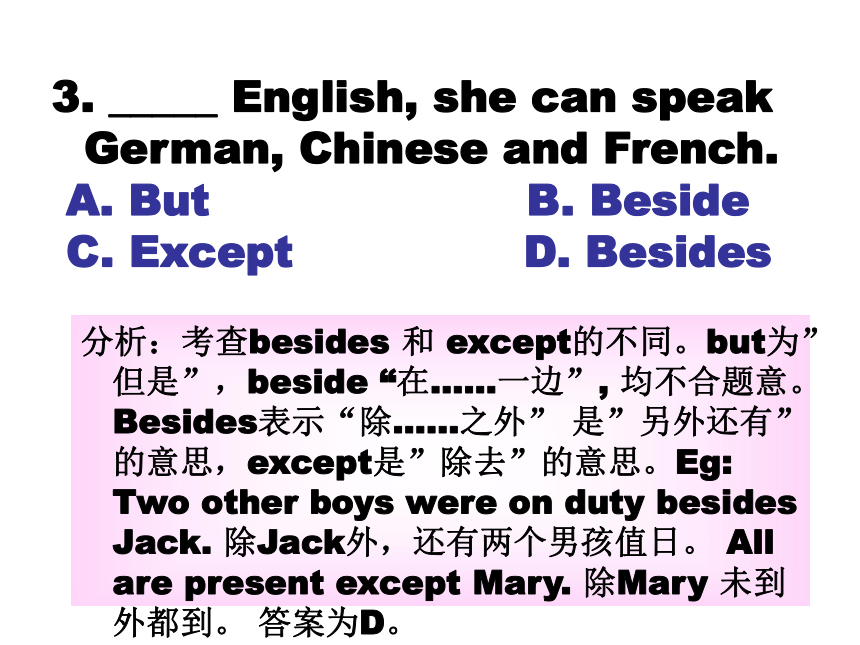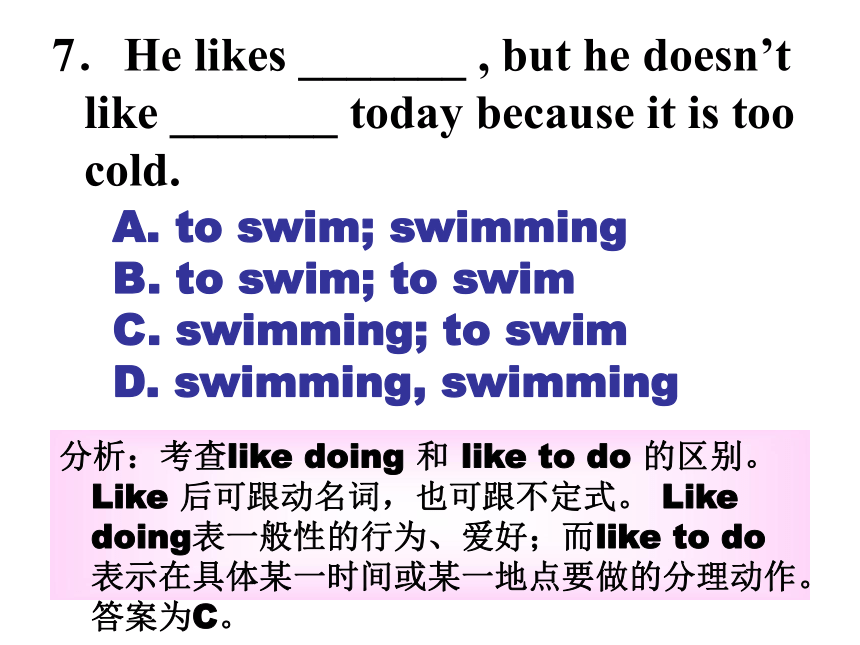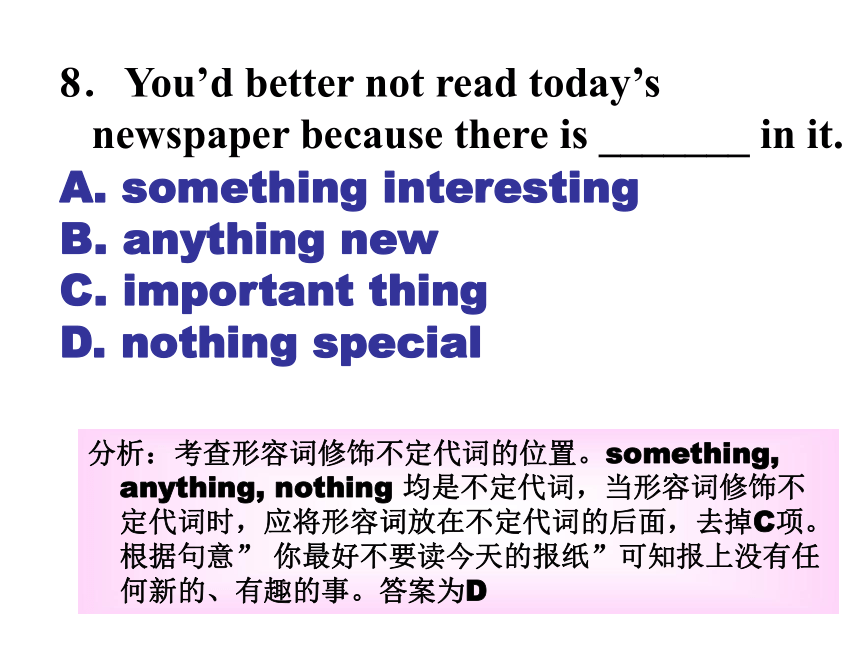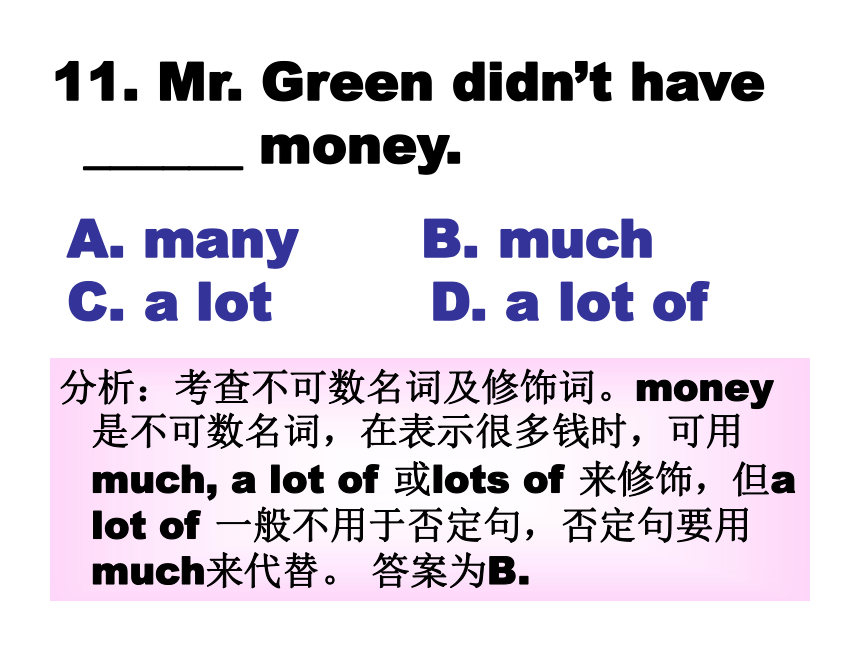中考英语专题课件:单项选择56题详解(56PPT)
文档属性
| 名称 | 中考英语专题课件:单项选择56题详解(56PPT) |

|
|
| 格式 | zip | ||
| 文件大小 | 279.0KB | ||
| 资源类型 | 教案 | ||
| 版本资源 | 人教新目标(Go for it)版 | ||
| 科目 | 英语 | ||
| 更新时间 | 2019-12-28 11:34:16 | ||
图片预览












文档简介
(共56张PPT)
中考单选
精选56题讲解
A. will have B. is going to be
C. has D. is going to have
1. There _______ a football match on TV this evening.
分析:考查There be句型的一般将来时结构,there will be 和 there is/are/… going to be . 句中不能有表示所属关系的have/ has, 只能用表示存在关系的动词原形be. 答案B。
A. will B. is going to
C. will be D. must
2. Look at the clouds ! It _______ rain.
分析: 考查be going to 与will 的区别。句中有表明马上要发生或打算要做的事情一般有be going to 结构,不用will. 前句的“See the clouds !”可以看出来。 答案为B。
3. _____ English, she can speak German, Chinese and French.
A. But B. Beside
C. Except D. Besides
分析:考查besides 和 except的不同。but为”但是”,beside “在……一边”, 均不合题意。Besides表示“除……之外” 是”另外还有”的意思,except是”除去”的意思。Eg: Two other boys were on duty besides Jack. 除Jack外,还有两个男孩值日。 All are present except Mary. 除Mary 未到外都到。 答案为D。
4. If you want to be thinner and healthier, you’d better eat _____ food and take ______ exercise.
A. more; fewer B. more; less
C. fewer; more D. less; more
分析:考查比较级形容词修饰名词的用法。Food为不可数名词,所以可以用much和less ; 虽然much可用于修饰不可数名词,但不符合题意,答案为D。
5. A: I saw Ann ______ a green dress at the meeting.
B: I think she looks better ______ red.
dressed; in B. put on; wear
C. wearing; in D. wear; put on
分析:考查“穿“的用法及区别。 See后接不带to的不定式或现在分词作宾语补足语。Put on 和wear 都可接表示衣服的名词,但put on 表示动作,wear强调状态,都不接表示颜色的名词,而in 的后面可接表示衣服的颜色的名词。 答案C。
6.Harry Potter is an _______ book for children, but my cousin doesn’t seem at all ________ in it.
A. interesting; interesting
B. interested; interested
C. interesting; interested
D. interested; interesting
分析:考查interest的两个形容词interested和interesting的区别。表示感彩的及物动词interest, 有现在分词interesting 和过去分词interested两个形式。前者表示”令人感兴趣”, 后者表示”使感到有兴趣”. 前一空用interesting表示book所具有的特征;第二个空用interested 表示主语所处的状态。 答案为C. EG:I am very _______ in the country. Here I can see many ______ people. 选项同上。答案为 D。
7.He likes _______ , but he doesn’t like _______ today because it is too cold.
分析:考查like doing 和 like to do 的区别。Like 后可跟动名词,也可跟不定式。 Like doing表一般性的行为、爱好;而like to do 表示在具体某一时间或某一地点要做的分理动作。 答案为C。
A. to swim; swimming
B. to swim; to swim
C. swimming; to swim
D. swimming, swimming
8.You’d better not read today’s newspaper because there is _______ in it.
A. something interesting
B. anything new
C. important thing
D. nothing special
分析:考查形容词修饰不定代词的位置。something, anything, nothing 均是不定代词,当形容词修饰不定代词时,应将形容词放在不定代词的后面,去掉C项。根据句意” 你最好不要读今天的报纸”可知报上没有任何新的、有趣的事。答案为D
分析:考查need作实义动词和情态动词的用法。作实义动词时,有人称和时态的变化,且其后须有动词不定式;作情态动词时没有人称和时态的变化。 答案为C。
A. Does, need
B. Need, to
C. Does, need to
D. Needs, to
9._______ he ______ go to Beijing next week ?
A. not play B. not playing
C. not to play D. to play
分析:考查tell的用法。tell sb. (not) to do sth 告诉某人(不) 做某事。 根据下句句意”在街上玩危险”可知警察告诉那个小男孩不要在街上踢足球。 答案为C
10.The policeman told the little boy ______ football in the street. It’s dangerous.
11. Mr. Green didn’t have ______ money.
分析:考查不可数名词及修饰词。money是不可数名词,在表示很多钱时,可用much, a lot of 或lots of 来修饰,但a lot of 一般不用于否定句,否定句要用much来代替。 答案为B.
A. many B. much
C. a lot D. a lot of
12. ----Mum, I think I’m _______ to get back to school.
----Not really, my dear. You’d better stay at home for another day or two .
A. so well B. so good
C. well enough D. good enough
分析:考查good, well和enough的用法。在英语中表身体健康well. Enough是应用比较频繁的词,用法是1. 用在名词前,如enough money 2.用在形容词或副词的后面. 如big enough. 答案为C.
13. ----How long have you ______ the motorbike?
----For about two weeks.
分析:考查现在完成时的瞬间动词和持续性动词的区别。若要与一段时间连用须用持续性动词。bought买,borrowed借入, lent借出均为瞬间动词。 答案为B。
A. bought B. had
C. borrowed D. lent
---Why don’t you have a notebook with you?
--- I’ve ______ it at home.
分析:考查lea ve和forget在作” 忘记”时的区别。根据上下文意表示把笔记本忘记在了家中,是忘记了一样具体的事物,应用leave过去式为left. 答案为C。
A. lost B. forgotten
C. left D. found
15. John fell asleep _______ he was listening to the music.
分析:考查连词while的用法。while意为”当……时候”, 只指”时间段” ,不指 “时间点”,从句的动词只限于持续性动词。 根据句意, 答案为C。
A. after B. before
C. while D. as soon as
16. The students of Class One are helping the farmers. Some are picking apples, ______ are holding the ladders.
A. another B. the other
C. others D. other
分析:考查other的用法。other作形容词用,只能用作定语,不能用作表语。后接名词; another 意为”另一个”, 但another指不定数目中的另一个;the other 是指两者中的另一个。 常见搭配为one… the other…; others 意为”其余的”, 表示别的人或物,常用词组为some… others…答案为C。
17. ----- I called you yesterday afternoon, but there was no reply.
-----I ______ a dolphin show in the zoo with my cousins.
A. watched
B. will watch
C. am watching
D. was watching
分析:考查过去进行时。根据上下文可知动作发生在过去,故排除BC。 当对方打电话时是正在看海豚表演,故用过去进行时。 答案D。
18. “Don’t always make Michael _______ this or that. He is already a big boy, dear.” Mr Bush said to his wife.
分析:考查make的用法。make后接动原或动名词作宾补。答案为A。
A. do B. to do
C. does D. did
19. When they went into the park, they saw someone ______ Chinese Kongfu.
分析:考查see的用法。see后接动原或动名词作宾补。答案为D。
A. plays B. played
C. to play D. playing
20. There are many apples ________ the tree. A bird _______ the tree is picking an apple.
分析:考查in the tree 和 on the tree的区别。表示树本身所固有的东西用on the tree,否则用 in the tree.
Eg :The apples on the tree are ripe.
树上的苹果熟了。
There is a bird in the tree.
树上有一只小鸟。
A. in, on B. on, in
C. in, at D. at; in
21. We should keep our classroom _________.
分析:考查keep 的用法。keep 意为”使继续处于某种状态”时,后面可接分词、形容词、副词、介词短语等作宾语补足语;而clean本身既可作动词,又作形容词。 根据句意“我们应该保持教室清洁”, 答案为B。
A. cleaned B. clean
C. cleaning D. to clean
22. ----Could you tell me ________?
-----Sorry, I don’t know. I was not at the meeting.
A. what does he say at the meeting
B. what did he say at the meeting
C. what he says at the meeting
D. what he said at the meeting
分析:考查宾语从句的语序。从句应使用陈述句语序。 由此排除AB。 C项在时态上不符合。答案为D。
23. Tom passed the maths exam. All of the students were surprised at it.
分析:考查surprised 的同义词。surprised 意为”惊奇的”。 excited意为”激动的”;frightened意为”害怕的”;pleased意为”高兴的”;amazed意为”吃惊的、惊奇的。 答案为D。
A. excited B. frightened
C. pleased D. amazed
A. happened B. have happened
C. happen D. are happening
分析:happen意为”发生”,往往带有”偶然”或”未能预见”的意思, 与take place 同义。由in the 100 years可知用现在完成时。答案为B。
24. -----As everyone knows, the way of farming has changed a lot.
----Of course. And some other changes _______ on farms in the last 100 years.
25. I hope _______ a good job in a foreign company after I graduate ________ school.
分析:hope意为”希望”, 后可接不定式或that 从句,但不可接动名词,故排除BD。Graduate意为”毕业”,常与介词from连用,答案为A。
A. to find; from B. finding; from
C. to find; at D. finding; at
26. The boss didn’t like James as he was not _______ learning new things.
分析:A项是”害怕”, B项是”担心……”, C项补充完整应为”do well in “ 意为” 在……方面做得好”, 与be good at 同义。 答案为D。
A. afraid of B. worried about
C. well in D. good at
27. Will your mother ______ you if you _______ the English exam?
分析:考查be mad at 的用法。 be mad 后接介词at, 排除CD。 本句为条件状语从句,主句一般将来时而从句用一般现在时, 答案为A。
A. be mad at, don’t pass
B. be mad at , won’t pass
C. be mad to, don’t pass
D. be mad to, won’t pass
28. Tomorrow is Sunday. Jim will go hiking with his friends if it ________.
分析:考查条件状语从句中时态的一致性原则。If引导的从句应该用一般现在时代替一般将来时。 答案为B。
A. isn't rain B. doesn't rain
C. won't rain D. don't rain
29. ----David has made great progress recently.
----______ and _______ .
分析:考查so的两种句式。So的倒装句式,so+ be/助动词/ 情态动词 + 主语,表示后面的情况与前面说过的情况相同。 So的强调句式, so +主语+ be/助动词/ 情态动词, 表示强调前面的情况。答案为A。
A. So he has, so have you
B. So he has, so you have
C. So has he, so you have
D. So has he , so have you
30. ----Is he going to stay here long ?
---________.
分析:考查be going to 和will 在表将来的区别。Be going to do sth , 而will + V原形,二者的结构不能混用。答案D。
A. Yes, he will
B. No, he won't
C. Yes, he isn't
D. No, he isn't
31. ----Can you catch what I said?
----Sorry, I can _____understand it.
分析:考查程度副词的用法。四个选项的意思分别为”几乎”, “几乎不”, “将近”,”从来没有”. 用在情态动词之后,行为动词之前。 句意为”你能理解我说的话吗?对不起,我几乎不能理解.” 答案为B。
A. almost B. hardly
C. nearly D. never
32. -----Why don't you ask Tom to do it ?
----I don't know if he is ________ to. He sometimes makes things worse.
分析:考查be able to 的用法。从后半句中”他有时把事情弄的更糟.” Be able to 表示”能够”, 是一动词短语。 当上句中的动词在下句中再次出现时,为避免重复,动词不定式后面的do 可以省掉,只保留不定式符号to. 答案 为B。
A. possible B. able
C. afraid D. easy
----Can you tell me if he ________ ?
----If he _________, I will call you.
分析: 考查if的用法。第一个if意为” 是否”用于引导宾语从句;第二个if意为”如果”,用于引导条件状语从句,根据时态一致性原则,第二个if引导的句子应用一般现在时。句意” 你能否能告诉我他是否会来。” 根据句意应用将来时,答案为B。
A. comes, comes
B. will come, comes
C. comes, will come
D. will come, will come
34. This question is ________ more difficult than that one.
分析:考查比较级的修饰语。比较级的修饰语可以使用much, a little和 a bit。 故排除D。而quite和very只能修饰原级。 答案为A。
A. even B. quite
C. very D. little
35. Internet bars mustn't let people under 18 in or let anybody _______ bad things.
分析:考查动词不定式作宾补的用法。Let sb do sth, 后接动词原形。 答案为A。
A. watch B. to watch
C. watching D. watches
36. ----_______ has this food store been in business?
----Since 2001.
分析:考查现在完成进行时中对since引导的时间状语进行提问。A项提问一段时间, 意为” 多长时间”;B项提问做事的频率,意为” 多长时间一次”;C项提问年龄,意为” 多大”;D项提问在一段时间内,意为” 多久”;根据句意“食品店是2001年开始营业一直持续到现在,指长达一段时间,要用how long.
A. How long B. How often
C. How old D. How soon
37. ----How long have you _______ that?
---For about two years.
分析:考查时态结构。从答语” 长达两年”,表示的是一段时间,常与现在完成进行时连用。而现在完成进行时的结构为” have/has + been+V-ing”. 答案为B。
A. doing B. been doing
C. did D. does
38. The earth is our home. We must _______ the land, air and water clean.
分析:考查keep+宾语+宾补的用法。”the land, air and water”是宾语,而clean是形容词作宾补。A项意为”改变”,B项意为”分享”,C项意为”注意”, 以上三者,前两者中能接宾语,后者只能接不带to 的不定式或V-ing作宾补。 答案为D
A. change B. share
C. notice D. keep
39. The radio is too loud. Will you please _______ ?
分析:考查动词+副词型短语。Turn down调低,关小;turn on/ off 打开/ 关上(电灯、煤气),其后接代词作宾语必须放在动词与副词之间;若接名词作宾语, 放在副词前后均可。 答案A。
A. turn it down
B. turn it on
C. turn off it
D. turn down it
40. You must wait ______ line when you are waiting _______ a bus.
分析:考查固定短语中介词的选用。题干中line意为” 排,队”,此时它前面常用介词in,构成短语in line成排,成队。 故排除AD。根据句意第二格应为” 等公共汽车”,而不是”在公共汽车上等”,故应选for 以构成固定短语wait for等待。 答案B。
A. on, in B. in, for
C. in, on D. on, for
41. Class is over. Let's stop ______.
分析:考查stop doing 和stop to do 的用法及区别。Have a rest 是一个固定短语。表示” 休息”;stop后接不定式作目的状语,表示” 停止正在干的事而去做另一件事。” 答案B。
A. have a rest
B. to have a rest
C. to have rest
D. having a rest
42. If you don’t know a word, you can ______ in the dictionary.
分析:考查look相关的词组。Look for 寻找,一般用于找一个具体的东西;look over有” 检查”之意。 两者均不符题意。Look up “ 在字典中查找”,其中up是副词,代词it应放在中间, 答案C。
A. look up it B. look for it
C. look it up D. look it over
43. Please give me a call when you ______ Beijing.
分析:考查get, reach, arrive的区别。三者均有” 到达”之意。 然而get, arrive是不及物动词,后不能直接加名词。Get to, arrive in/ at +地点;排除AC。 Reach是及物动词, 后不需to, 答案B。
A. get in B. reach
C. arrive D. reach to
44. Bob never does his homework ______ Marry. He makes lots of mistakes.
分析:考查 同级比较句型的用法及形容词和副词的区别。 表示相同程度的比较,肯定式用as…as…,否定式为not as/ so …as. 前面的as/so 为副词, 修饰形容词或副词表程度;后面的as是连词,连接省略的比较状语从句。 另外,careful是形容词,carefully是副词,句中的does是实义动词,只能用carefully来修饰。答案B
A. so careful as B. as carefully as
C. carefully as D. as careful as
45. They preferred ________ in bed rather than ______ horses.
分析:考查prefer一词。Prefer A to B 喜欢A胜过B。 prefer doing A to doing B喜欢做A胜过做B;prefer to do A rather than do B. 与做B相比更喜欢做A。 根据以上分析选 C。
A. to lie; to ride B. lying; riding
C. to lie; ride D. lying, ride
46. Sam_______ in Paris for ten years. But now he lives in London.
分析:考查一般现在时与现在完成时的区别。容易错在For ten years表示长达一段时间,误选A。 事实上主语现在已不在Paris居住了,只表明他过去住在Paris,故应该用一般过去时。
A. has lived B. is living
C. lived D. lives
47. -----Where is Mary?
----She ______ to Harbin.
分析:考查has gone 和has gone的区别。由句意可知,Mary不在现场。因为has been表示去了某地又回来了,所以用has gone. 答案为B。
A. has been B. has gone
C. had been D. had gone
48. -----Nice to see you. I _______ you for a long time.
-----I _______ in Beijing, I’ve just come back.
分析:考查现在完成时与一般过去时的区别。 For a long time 意为从过去开始到现在为止的一段时间 ,属现在完成时的时间状语, 故排除CD。 由答语”刚刚回来” 可知, “ 在北京”属于过去,应该用一般过去时。 答案B
haven’t seen, am
B. haven’t seen; was
C. didn’t see; will be
D. didn’t see; was
49. My mother doesn’t like doing the housework at home. She usually ______ much time shopping in the supermarkets.
分析:考查有关”花费”的相关内容。Take一般只用于花费在时间上。在指花费金钱时,pay和spend的主语必须是人,即人在某物上花费了多少钱;cost的主语一般是物,即某物花了某人多少钱, 在题干是it,所以答案为A。
A. spends B. costs
C. takes D. pays
50. -----Could you tell me ______ you’ve been here?
----Since last year.
分析:考查how引导的疑问词。 Since last year表明是从过去一直持续到现在的一段时间。表示一段时间的疑问词只有how long, 所以选D。 其他均不符合题意。
A. how far B. how often
C. how soon D. how long
51. ----Would you like a cup of tea or coffee?
----_________. I’d like a glass of water.
分析:弄清none, both, neither, all, either, each等词本身表示肯定还是否定。 None表示数量在三者或三者以上;而题干只给出了两项,tea, coffee, 所以排除C项。Both表示肯定,“两者都”, either表示”(两者之中) 任何一个; ”而neither表示否定, 两者都不。根据回答,两样都不要。 所以选A。
A. Neither B. Both
C. None D. Either
52. Let’s go to the movies together, _______ ?
分析:考查祈使句的反意问句。祈使句的反意问句都用肯定结构。Let’s…., 指的是说话和听话人都做某事,因此用shall we;Let us…中的us不包括听话人在内,因此用will you。 以其他动词开头的祈使句,都是在请求对方做某事,省略了主语you, 所以要用will you。答案D。
A. don’t you B. won’t you
C. will you D. shall we
53. They have never been to New York, _______ ?
分析:两题均考查反意疑问句。做此类题1。看清陈述部分的形式。2。弄清陈述部分的时态结构。3。陈述部分中有没有本身表示否定的副词。 引导词let’s表达的意思应该包括听话的人,即说者和听者均在内。对应的要用shall we. 如果是let us, 则要用will you. 其实句中有本身表示否定的副词never,这样陈述部分便成了否定式。简短问句要用肯定式。 答案为A。
A. have they B. haven’t they
C. don’t they D. do they
54. Oliver was so busy ______ a novel that he ______ to have dinner.
分析:考查be busy的用法。Be busy后接动名词形式意为” 忙于做某事”可排除BC;本句又为so…that…引导的结果状语从句,主句与从句的时态必须一致,主句的谓语动词was为过去时, 所以从句中的谓语动词必须用过去时, 答案为D。
A. reading, forgets
B. to read; forgets
C. to read; forgot
D. reading, forgot
56. She always finishes her homework on time. She _______ leaves it for tomorrow.
分析:考查频度副词。always总是,usually通常;sometimes有时,never从来没有。 根据句意他总是按时完成作业,从不留到明天去做。 答案为B。
A. always B. never
C. usually D. sometimes
中考单选
精选56题讲解
A. will have B. is going to be
C. has D. is going to have
1. There _______ a football match on TV this evening.
分析:考查There be句型的一般将来时结构,there will be 和 there is/are/… going to be . 句中不能有表示所属关系的have/ has, 只能用表示存在关系的动词原形be. 答案B。
A. will B. is going to
C. will be D. must
2. Look at the clouds ! It _______ rain.
分析: 考查be going to 与will 的区别。句中有表明马上要发生或打算要做的事情一般有be going to 结构,不用will. 前句的“See the clouds !”可以看出来。 答案为B。
3. _____ English, she can speak German, Chinese and French.
A. But B. Beside
C. Except D. Besides
分析:考查besides 和 except的不同。but为”但是”,beside “在……一边”, 均不合题意。Besides表示“除……之外” 是”另外还有”的意思,except是”除去”的意思。Eg: Two other boys were on duty besides Jack. 除Jack外,还有两个男孩值日。 All are present except Mary. 除Mary 未到外都到。 答案为D。
4. If you want to be thinner and healthier, you’d better eat _____ food and take ______ exercise.
A. more; fewer B. more; less
C. fewer; more D. less; more
分析:考查比较级形容词修饰名词的用法。Food为不可数名词,所以可以用much和less ; 虽然much可用于修饰不可数名词,但不符合题意,答案为D。
5. A: I saw Ann ______ a green dress at the meeting.
B: I think she looks better ______ red.
dressed; in B. put on; wear
C. wearing; in D. wear; put on
分析:考查“穿“的用法及区别。 See后接不带to的不定式或现在分词作宾语补足语。Put on 和wear 都可接表示衣服的名词,但put on 表示动作,wear强调状态,都不接表示颜色的名词,而in 的后面可接表示衣服的颜色的名词。 答案C。
6.Harry Potter is an _______ book for children, but my cousin doesn’t seem at all ________ in it.
A. interesting; interesting
B. interested; interested
C. interesting; interested
D. interested; interesting
分析:考查interest的两个形容词interested和interesting的区别。表示感彩的及物动词interest, 有现在分词interesting 和过去分词interested两个形式。前者表示”令人感兴趣”, 后者表示”使感到有兴趣”. 前一空用interesting表示book所具有的特征;第二个空用interested 表示主语所处的状态。 答案为C. EG:I am very _______ in the country. Here I can see many ______ people. 选项同上。答案为 D。
7.He likes _______ , but he doesn’t like _______ today because it is too cold.
分析:考查like doing 和 like to do 的区别。Like 后可跟动名词,也可跟不定式。 Like doing表一般性的行为、爱好;而like to do 表示在具体某一时间或某一地点要做的分理动作。 答案为C。
A. to swim; swimming
B. to swim; to swim
C. swimming; to swim
D. swimming, swimming
8.You’d better not read today’s newspaper because there is _______ in it.
A. something interesting
B. anything new
C. important thing
D. nothing special
分析:考查形容词修饰不定代词的位置。something, anything, nothing 均是不定代词,当形容词修饰不定代词时,应将形容词放在不定代词的后面,去掉C项。根据句意” 你最好不要读今天的报纸”可知报上没有任何新的、有趣的事。答案为D
分析:考查need作实义动词和情态动词的用法。作实义动词时,有人称和时态的变化,且其后须有动词不定式;作情态动词时没有人称和时态的变化。 答案为C。
A. Does, need
B. Need, to
C. Does, need to
D. Needs, to
9._______ he ______ go to Beijing next week ?
A. not play B. not playing
C. not to play D. to play
分析:考查tell的用法。tell sb. (not) to do sth 告诉某人(不) 做某事。 根据下句句意”在街上玩危险”可知警察告诉那个小男孩不要在街上踢足球。 答案为C
10.The policeman told the little boy ______ football in the street. It’s dangerous.
11. Mr. Green didn’t have ______ money.
分析:考查不可数名词及修饰词。money是不可数名词,在表示很多钱时,可用much, a lot of 或lots of 来修饰,但a lot of 一般不用于否定句,否定句要用much来代替。 答案为B.
A. many B. much
C. a lot D. a lot of
12. ----Mum, I think I’m _______ to get back to school.
----Not really, my dear. You’d better stay at home for another day or two .
A. so well B. so good
C. well enough D. good enough
分析:考查good, well和enough的用法。在英语中表身体健康well. Enough是应用比较频繁的词,用法是1. 用在名词前,如enough money 2.用在形容词或副词的后面. 如big enough. 答案为C.
13. ----How long have you ______ the motorbike?
----For about two weeks.
分析:考查现在完成时的瞬间动词和持续性动词的区别。若要与一段时间连用须用持续性动词。bought买,borrowed借入, lent借出均为瞬间动词。 答案为B。
A. bought B. had
C. borrowed D. lent
---Why don’t you have a notebook with you?
--- I’ve ______ it at home.
分析:考查lea ve和forget在作” 忘记”时的区别。根据上下文意表示把笔记本忘记在了家中,是忘记了一样具体的事物,应用leave过去式为left. 答案为C。
A. lost B. forgotten
C. left D. found
15. John fell asleep _______ he was listening to the music.
分析:考查连词while的用法。while意为”当……时候”, 只指”时间段” ,不指 “时间点”,从句的动词只限于持续性动词。 根据句意, 答案为C。
A. after B. before
C. while D. as soon as
16. The students of Class One are helping the farmers. Some are picking apples, ______ are holding the ladders.
A. another B. the other
C. others D. other
分析:考查other的用法。other作形容词用,只能用作定语,不能用作表语。后接名词; another 意为”另一个”, 但another指不定数目中的另一个;the other 是指两者中的另一个。 常见搭配为one… the other…; others 意为”其余的”, 表示别的人或物,常用词组为some… others…答案为C。
17. ----- I called you yesterday afternoon, but there was no reply.
-----I ______ a dolphin show in the zoo with my cousins.
A. watched
B. will watch
C. am watching
D. was watching
分析:考查过去进行时。根据上下文可知动作发生在过去,故排除BC。 当对方打电话时是正在看海豚表演,故用过去进行时。 答案D。
18. “Don’t always make Michael _______ this or that. He is already a big boy, dear.” Mr Bush said to his wife.
分析:考查make的用法。make后接动原或动名词作宾补。答案为A。
A. do B. to do
C. does D. did
19. When they went into the park, they saw someone ______ Chinese Kongfu.
分析:考查see的用法。see后接动原或动名词作宾补。答案为D。
A. plays B. played
C. to play D. playing
20. There are many apples ________ the tree. A bird _______ the tree is picking an apple.
分析:考查in the tree 和 on the tree的区别。表示树本身所固有的东西用on the tree,否则用 in the tree.
Eg :The apples on the tree are ripe.
树上的苹果熟了。
There is a bird in the tree.
树上有一只小鸟。
A. in, on B. on, in
C. in, at D. at; in
21. We should keep our classroom _________.
分析:考查keep 的用法。keep 意为”使继续处于某种状态”时,后面可接分词、形容词、副词、介词短语等作宾语补足语;而clean本身既可作动词,又作形容词。 根据句意“我们应该保持教室清洁”, 答案为B。
A. cleaned B. clean
C. cleaning D. to clean
22. ----Could you tell me ________?
-----Sorry, I don’t know. I was not at the meeting.
A. what does he say at the meeting
B. what did he say at the meeting
C. what he says at the meeting
D. what he said at the meeting
分析:考查宾语从句的语序。从句应使用陈述句语序。 由此排除AB。 C项在时态上不符合。答案为D。
23. Tom passed the maths exam. All of the students were surprised at it.
分析:考查surprised 的同义词。surprised 意为”惊奇的”。 excited意为”激动的”;frightened意为”害怕的”;pleased意为”高兴的”;amazed意为”吃惊的、惊奇的。 答案为D。
A. excited B. frightened
C. pleased D. amazed
A. happened B. have happened
C. happen D. are happening
分析:happen意为”发生”,往往带有”偶然”或”未能预见”的意思, 与take place 同义。由in the 100 years可知用现在完成时。答案为B。
24. -----As everyone knows, the way of farming has changed a lot.
----Of course. And some other changes _______ on farms in the last 100 years.
25. I hope _______ a good job in a foreign company after I graduate ________ school.
分析:hope意为”希望”, 后可接不定式或that 从句,但不可接动名词,故排除BD。Graduate意为”毕业”,常与介词from连用,答案为A。
A. to find; from B. finding; from
C. to find; at D. finding; at
26. The boss didn’t like James as he was not _______ learning new things.
分析:A项是”害怕”, B项是”担心……”, C项补充完整应为”do well in “ 意为” 在……方面做得好”, 与be good at 同义。 答案为D。
A. afraid of B. worried about
C. well in D. good at
27. Will your mother ______ you if you _______ the English exam?
分析:考查be mad at 的用法。 be mad 后接介词at, 排除CD。 本句为条件状语从句,主句一般将来时而从句用一般现在时, 答案为A。
A. be mad at, don’t pass
B. be mad at , won’t pass
C. be mad to, don’t pass
D. be mad to, won’t pass
28. Tomorrow is Sunday. Jim will go hiking with his friends if it ________.
分析:考查条件状语从句中时态的一致性原则。If引导的从句应该用一般现在时代替一般将来时。 答案为B。
A. isn't rain B. doesn't rain
C. won't rain D. don't rain
29. ----David has made great progress recently.
----______ and _______ .
分析:考查so的两种句式。So的倒装句式,so+ be/助动词/ 情态动词 + 主语,表示后面的情况与前面说过的情况相同。 So的强调句式, so +主语+ be/助动词/ 情态动词, 表示强调前面的情况。答案为A。
A. So he has, so have you
B. So he has, so you have
C. So has he, so you have
D. So has he , so have you
30. ----Is he going to stay here long ?
---________.
分析:考查be going to 和will 在表将来的区别。Be going to do sth , 而will + V原形,二者的结构不能混用。答案D。
A. Yes, he will
B. No, he won't
C. Yes, he isn't
D. No, he isn't
31. ----Can you catch what I said?
----Sorry, I can _____understand it.
分析:考查程度副词的用法。四个选项的意思分别为”几乎”, “几乎不”, “将近”,”从来没有”. 用在情态动词之后,行为动词之前。 句意为”你能理解我说的话吗?对不起,我几乎不能理解.” 答案为B。
A. almost B. hardly
C. nearly D. never
32. -----Why don't you ask Tom to do it ?
----I don't know if he is ________ to. He sometimes makes things worse.
分析:考查be able to 的用法。从后半句中”他有时把事情弄的更糟.” Be able to 表示”能够”, 是一动词短语。 当上句中的动词在下句中再次出现时,为避免重复,动词不定式后面的do 可以省掉,只保留不定式符号to. 答案 为B。
A. possible B. able
C. afraid D. easy
----Can you tell me if he ________ ?
----If he _________, I will call you.
分析: 考查if的用法。第一个if意为” 是否”用于引导宾语从句;第二个if意为”如果”,用于引导条件状语从句,根据时态一致性原则,第二个if引导的句子应用一般现在时。句意” 你能否能告诉我他是否会来。” 根据句意应用将来时,答案为B。
A. comes, comes
B. will come, comes
C. comes, will come
D. will come, will come
34. This question is ________ more difficult than that one.
分析:考查比较级的修饰语。比较级的修饰语可以使用much, a little和 a bit。 故排除D。而quite和very只能修饰原级。 答案为A。
A. even B. quite
C. very D. little
35. Internet bars mustn't let people under 18 in or let anybody _______ bad things.
分析:考查动词不定式作宾补的用法。Let sb do sth, 后接动词原形。 答案为A。
A. watch B. to watch
C. watching D. watches
36. ----_______ has this food store been in business?
----Since 2001.
分析:考查现在完成进行时中对since引导的时间状语进行提问。A项提问一段时间, 意为” 多长时间”;B项提问做事的频率,意为” 多长时间一次”;C项提问年龄,意为” 多大”;D项提问在一段时间内,意为” 多久”;根据句意“食品店是2001年开始营业一直持续到现在,指长达一段时间,要用how long.
A. How long B. How often
C. How old D. How soon
37. ----How long have you _______ that?
---For about two years.
分析:考查时态结构。从答语” 长达两年”,表示的是一段时间,常与现在完成进行时连用。而现在完成进行时的结构为” have/has + been+V-ing”. 答案为B。
A. doing B. been doing
C. did D. does
38. The earth is our home. We must _______ the land, air and water clean.
分析:考查keep+宾语+宾补的用法。”the land, air and water”是宾语,而clean是形容词作宾补。A项意为”改变”,B项意为”分享”,C项意为”注意”, 以上三者,前两者中能接宾语,后者只能接不带to 的不定式或V-ing作宾补。 答案为D
A. change B. share
C. notice D. keep
39. The radio is too loud. Will you please _______ ?
分析:考查动词+副词型短语。Turn down调低,关小;turn on/ off 打开/ 关上(电灯、煤气),其后接代词作宾语必须放在动词与副词之间;若接名词作宾语, 放在副词前后均可。 答案A。
A. turn it down
B. turn it on
C. turn off it
D. turn down it
40. You must wait ______ line when you are waiting _______ a bus.
分析:考查固定短语中介词的选用。题干中line意为” 排,队”,此时它前面常用介词in,构成短语in line成排,成队。 故排除AD。根据句意第二格应为” 等公共汽车”,而不是”在公共汽车上等”,故应选for 以构成固定短语wait for等待。 答案B。
A. on, in B. in, for
C. in, on D. on, for
41. Class is over. Let's stop ______.
分析:考查stop doing 和stop to do 的用法及区别。Have a rest 是一个固定短语。表示” 休息”;stop后接不定式作目的状语,表示” 停止正在干的事而去做另一件事。” 答案B。
A. have a rest
B. to have a rest
C. to have rest
D. having a rest
42. If you don’t know a word, you can ______ in the dictionary.
分析:考查look相关的词组。Look for 寻找,一般用于找一个具体的东西;look over有” 检查”之意。 两者均不符题意。Look up “ 在字典中查找”,其中up是副词,代词it应放在中间, 答案C。
A. look up it B. look for it
C. look it up D. look it over
43. Please give me a call when you ______ Beijing.
分析:考查get, reach, arrive的区别。三者均有” 到达”之意。 然而get, arrive是不及物动词,后不能直接加名词。Get to, arrive in/ at +地点;排除AC。 Reach是及物动词, 后不需to, 答案B。
A. get in B. reach
C. arrive D. reach to
44. Bob never does his homework ______ Marry. He makes lots of mistakes.
分析:考查 同级比较句型的用法及形容词和副词的区别。 表示相同程度的比较,肯定式用as…as…,否定式为not as/ so …as. 前面的as/so 为副词, 修饰形容词或副词表程度;后面的as是连词,连接省略的比较状语从句。 另外,careful是形容词,carefully是副词,句中的does是实义动词,只能用carefully来修饰。答案B
A. so careful as B. as carefully as
C. carefully as D. as careful as
45. They preferred ________ in bed rather than ______ horses.
分析:考查prefer一词。Prefer A to B 喜欢A胜过B。 prefer doing A to doing B喜欢做A胜过做B;prefer to do A rather than do B. 与做B相比更喜欢做A。 根据以上分析选 C。
A. to lie; to ride B. lying; riding
C. to lie; ride D. lying, ride
46. Sam_______ in Paris for ten years. But now he lives in London.
分析:考查一般现在时与现在完成时的区别。容易错在For ten years表示长达一段时间,误选A。 事实上主语现在已不在Paris居住了,只表明他过去住在Paris,故应该用一般过去时。
A. has lived B. is living
C. lived D. lives
47. -----Where is Mary?
----She ______ to Harbin.
分析:考查has gone 和has gone的区别。由句意可知,Mary不在现场。因为has been表示去了某地又回来了,所以用has gone. 答案为B。
A. has been B. has gone
C. had been D. had gone
48. -----Nice to see you. I _______ you for a long time.
-----I _______ in Beijing, I’ve just come back.
分析:考查现在完成时与一般过去时的区别。 For a long time 意为从过去开始到现在为止的一段时间 ,属现在完成时的时间状语, 故排除CD。 由答语”刚刚回来” 可知, “ 在北京”属于过去,应该用一般过去时。 答案B
haven’t seen, am
B. haven’t seen; was
C. didn’t see; will be
D. didn’t see; was
49. My mother doesn’t like doing the housework at home. She usually ______ much time shopping in the supermarkets.
分析:考查有关”花费”的相关内容。Take一般只用于花费在时间上。在指花费金钱时,pay和spend的主语必须是人,即人在某物上花费了多少钱;cost的主语一般是物,即某物花了某人多少钱, 在题干是it,所以答案为A。
A. spends B. costs
C. takes D. pays
50. -----Could you tell me ______ you’ve been here?
----Since last year.
分析:考查how引导的疑问词。 Since last year表明是从过去一直持续到现在的一段时间。表示一段时间的疑问词只有how long, 所以选D。 其他均不符合题意。
A. how far B. how often
C. how soon D. how long
51. ----Would you like a cup of tea or coffee?
----_________. I’d like a glass of water.
分析:弄清none, both, neither, all, either, each等词本身表示肯定还是否定。 None表示数量在三者或三者以上;而题干只给出了两项,tea, coffee, 所以排除C项。Both表示肯定,“两者都”, either表示”(两者之中) 任何一个; ”而neither表示否定, 两者都不。根据回答,两样都不要。 所以选A。
A. Neither B. Both
C. None D. Either
52. Let’s go to the movies together, _______ ?
分析:考查祈使句的反意问句。祈使句的反意问句都用肯定结构。Let’s…., 指的是说话和听话人都做某事,因此用shall we;Let us…中的us不包括听话人在内,因此用will you。 以其他动词开头的祈使句,都是在请求对方做某事,省略了主语you, 所以要用will you。答案D。
A. don’t you B. won’t you
C. will you D. shall we
53. They have never been to New York, _______ ?
分析:两题均考查反意疑问句。做此类题1。看清陈述部分的形式。2。弄清陈述部分的时态结构。3。陈述部分中有没有本身表示否定的副词。 引导词let’s表达的意思应该包括听话的人,即说者和听者均在内。对应的要用shall we. 如果是let us, 则要用will you. 其实句中有本身表示否定的副词never,这样陈述部分便成了否定式。简短问句要用肯定式。 答案为A。
A. have they B. haven’t they
C. don’t they D. do they
54. Oliver was so busy ______ a novel that he ______ to have dinner.
分析:考查be busy的用法。Be busy后接动名词形式意为” 忙于做某事”可排除BC;本句又为so…that…引导的结果状语从句,主句与从句的时态必须一致,主句的谓语动词was为过去时, 所以从句中的谓语动词必须用过去时, 答案为D。
A. reading, forgets
B. to read; forgets
C. to read; forgot
D. reading, forgot
56. She always finishes her homework on time. She _______ leaves it for tomorrow.
分析:考查频度副词。always总是,usually通常;sometimes有时,never从来没有。 根据句意他总是按时完成作业,从不留到明天去做。 答案为B。
A. always B. never
C. usually D. sometimes
同课章节目录
- 词法
- 名词
- 动词和动词短语
- 动词语态
- 动词时态
- 助动词和情态动词
- 非谓语动词
- 冠词
- 代词
- 数词和量词
- 形容词副词及其比较等级
- 介词和介词短语
- 连词和感叹词
- 构词法
- 相似、相近词比较
- 句法
- 陈述句
- 一般疑问句和否定疑问句
- 特殊疑问句及选择疑问句
- 反意疑问句
- 存在句(There be句型)
- 宾语从句
- 定语从句
- 状语从句
- 主谓一致问题
- 简单句
- 并列句
- 复合句
- 主谓一致
- 主、表语从句
- 名词性从句
- 直接引语和间接引语
- 虚拟语气
- 感叹句
- 强调句
- 倒装句
- 祈使句
- 句子的成分
- 句子的分类
- 题型专区
- 单项选择部分
- 易错题
- 完形填空
- 阅读理解
- 词汇练习
- 听说训练
- 句型转换
- 补全对话
- 短文改错
- 翻译
- 书面表达
- 任务型阅读
- 语法填空
- 其他资料
